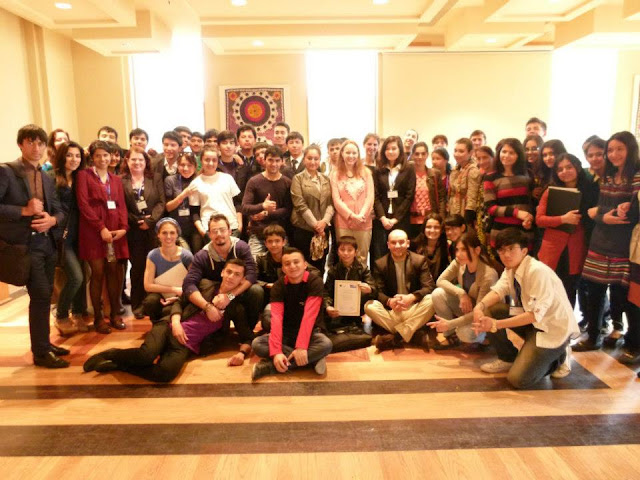Sughd, this northern region of Tajikistan, is known for being more formal. Everyone here always uses шумо (
shumo), the formal "you" (think
usted in Spanish), whereas in the south, in Khatlon, people use ту (
tu) frequently. I knew this before coming, like I knew that Tajikistan is renowned for its guest culture, but I didn't realize the many other ways in which that politeness would manifest itself in daily life, and I certainly didn't anticipate that it would take me months to figure out.
When someone invites you to his or her house, they repeat "хуш омадед" (
khush omaded - welcome) many times. I used to put my hand on my chest and repeat "thank you," unable to think of anything else to say. Only six months into my time here did someone tell me that the customary thing to respond - especially to older hosts - is "хушбахт бошед" (
khushbakht boshed - be happy). It was both relieving to hear that there is a ritual and frustrating - how did I not know this sooner!
Similarly, I was aware from the moment I arrived that hosts tell you to eat many times. "Гиритон, гиритон, гиритон" they repeat ("take," literally, or "help yourself"). Knowing how important the guest culture is here, I would studiously take food, and figured out to pace my eating and time big bites for when the host returned. What is on the dastarkhan at the beginning is just that, the beginning, and there is always more food coming. I joke that people do not know the meaning of the word "full" - when I say that "ман сеур шудам" (I am full), people bring me more food! People laugh appreciatively, because of course that is the job of the host - to give you more.
But only after living here seven months did I realize the other half of this Tajik courtesy. They say "гиретон" three times - and the guest is not supposed to accept the first few times. There is a dance of offering and demurring until people finally eat. Oops. Luckily, I have probably not offended anyone too badly - I just seem like an impolite pig. Since realizing this, I have heard countless stories from people in Sughd who have traveled to the United States and suffered their own cultural misunderstandings. "Do you want ice cream?" an American hostess asked a teacher friend. "No," the teacher replied, and then, as she told us, "the whole table ate ice cream and I sat there with none! I really wanted some, but I couldn't ask!" Another friend who said it took him a week of being hungry to realize that Americans were not going to ask again, and he would have to say yes the first time.
And I only realized a week ago that one does not talk while eating. Parents here teach their children not to do so. In the United States, parents also tell their children not to talk with their mouths full, but we also expect dinner to be a time for conversation, and people schedule lunch meetings in order to talk. I tried to think back to the many times I have been a guest: have I spent it chattering to fill silence? I think mostly I am quiet and try to let the host take the lead - remembering not to be uncomfortable in the silence (thank you, Sidwell).
Unfortunately I cannot regale you with tales of the hilarious faux pas I have made that people laughed at or judged or ignored and otherwise never pointed out to me. You will have to apply to my friends and acquaintances here for more details.
 |
| A table filled for Navruz at the library. |















